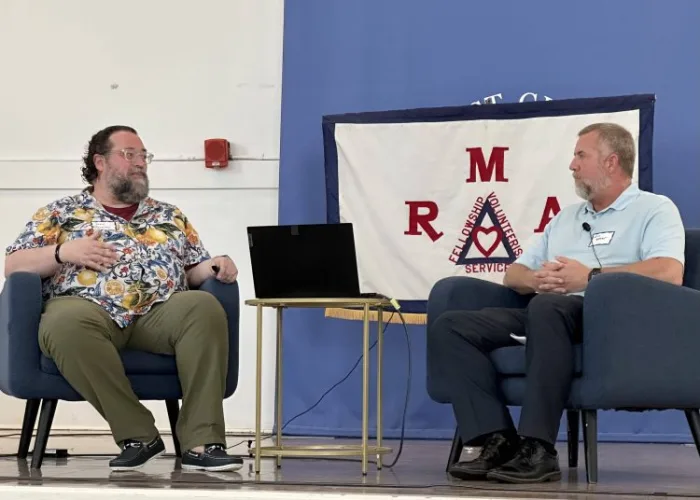
By Mike Tebay
At the July 23rd meeting of the Retired Men’s Association, Troy Johnson, the RMA’s publicity Chair, announced that the topic for the day’s presentation was “HumanMachine Interaction: Leadership, Technology, and the Future.” The speakers were Eric Glover and Dr. Jason Jackson, both affiliated with the US Air Force Institute of Technology, known as AFIT. They are both renowned experts in data science, analytics, and leadership. In this presentation they did NOT represent AFIT or the US government – but were appearing as private citizens.
Eric Glover is a former Marine, Naval Officer, and business leader, with decades of experience in organizational strategy and technology-driven change. Dr. Jason Jackson is a former military aviator and university professor, recognized for his research on leadership and information overload in highstress environments. Glover and Jackson have dedicated their careers to advancing leadership and decision-making in the age of artificial intelligence and machine learning. The future, they said, isn’t just about faster technology, but about more effective collaboration with machines. The knowledge they share is not just for generals and C-Suite executives but is informative to all—for everyday applications in life.
Dr. Jackson began by noting that he and Glover host “The Wild Card,” a monthly TV show they co-created to use technology to accelerate education for Air Force and Space Force data analysts and scientists.
Dr. Jackson went on to note that human-machine interaction is not a new issue. In fact, he traced it back 700 years to intricate clocks around 1324, which included special elements such as the phases of the moon, and which had a major impact on the ability to schedule people’s daily life. He noted its evolution through transportation, communication, the invention of the radio, television, wi-fi, cellphones, the modern internet, smart phones, and even the space race, always balancing automation to replace humans and augmentation as a tool to help humans.
A core subject of Dr. Jackson’s expertise was information overload, which he clarified is also not new, citing the Gutenberg printing press. He noted that today’s not atypical two-inch-thick Sunday newspaper contained more information than someone 500 years earlier would have seen in their entire life. But people even then experienced information overload. Some attempted to create encyclopedias to contain all human knowledge.
He referenced Alvin Toffler, who wrote the book “Future Shock” in 1970. Toffler coined the term “information overload,” and linked it to stress akin to the PTSD experienced by soldiers returning from Vietnam. Dr. Jackson’s research identified 16 coping mechanisms for information overload, and commented that leaders from diverse organizations – charities, business, the military, and government – all used these same coping mechanisms. The most powerful were prioritization (categorizing and filtering information) and taking positive control (akin to business controls). He also mentioned tacit knowledge (a combination of experiential knowledge and academic book knowledge) as vital for first responders.
The discussion then moved to the future of technology, with Dr. Jackson explaining that Moore’s Law (which says that every 18 to 24 months computer power and the number of transistors on a chip would double) is reaching its limits, as transistors approach the size of a single atom, paving the way for quantum computing. Glover explained that quantum computing, utilizing qubits for parallel processing, is now available from companies like IBM and Intel. He projected that a 100-qubit quantum computer, soon to be realized, could solve in hours or days complex problems which would take today’s fastest supercomputers a million years. However, he forecast that quantum computers would not replace traditional computers, but would work hand in hand with them to solve complex problems.
Glover stressed the significant electrical power demands of data centers, an average one requiring 10 megawatts – that is as much energy in one hour as that of an average American household in a full year, making it a critical “boardroom problem.” Dr. Jackson suggested compact nuclear reactors as a potential solution
Dr. Jackson noted that there is more literature in business on trust than on almost any other topic, because business cannot operate without trust. He went on to identify trust as the primary bottleneck in human-machine interaction, especially with AI. Can a business leader trust the information that he is receiving from AI, especially when, like today, the system is highly exploratory? Both speakers advocated for AI as an augmentation tool – a “thought partner” or “accelerator” to speed up human decision-making and project timelines – rather than a replacement for human decision making.
Practical advice included validating AI output via triangulation with multiple sources, using different models. Glover envisioned AI improving education by fostering discovery learning for permanent memory, rather than rote memory, which tends to be transient. One critical bottleneck, even with keyboards and mice, is the human cognitive bandwidth limit, one channel in via our senses to the brain, at 10-bits per second.
During the Q&A, Glover expressed excitement for AI, comparing it to the advent of the Internet. He recommended ChatGPT over other models which are typically wrong 20% of the time, and xAI’s Grok, which he found to be “50% wrong.” He praised Google’s NotebookLM for summarizing linked content and documents, even generating podcasts, to accelerate knowledge acquisition. Dr. Jackson highlighted AI’s potential to unlock vast unapplied medical research, noting that only 14% of the research in about 14 million medical journal articles published annually ever make it into practice.
On the competitive landscape, Dr. Jackson mentioned that companies like OpenAI and xAI use different algorithms and data sets, posing risks of bias. He described AI as “statistics on steroids,” performing lots of math really fast, but not sentient like humans. Glover differentiated current narrow AI (e.g. a model like ChatGPT4 was trained in 2023 and is static) from future Artificial General Intelligence (AGI), which will constantly evolve. He believed OpenAI, backed by Microsoft and Amazon AWS, had a competitive edge. Addressing user interface concerns, Glover shared Microsoft’s vision of a Copilot AI replacing complex applications with voice commands. Dr. Jackson added that small language models (SLMs), focused on specific contexts or subject matter, could reduce “hallucinations.” The speakers hoped AI would eventually auto-select the best model for a user’s specific query.
The talk can be viewed by going to the RMA website at https://greenwichrma.org, and clicking on “Speakers.”
The RMA’s upcoming presentation, “Is Cryptocurrency Here to Stay: Controversies and Consequences” by David Yermack, is scheduled for 11 AM on Wednesday, August 6, 2025. RMA presentations are held at Christ Church Greenwich, Parish Hall, 254 E. Putnam Avenue, Greenwich, CT 06830.
Dr. David Yermack will explain the latest developments in the rapidly expanding field of cryptocurrencies. In a January 2022 talk to the RMA, Dr. Yermack explained the concept of decentralized digital currencies. Bitcoin, blockchain, tokens and other terms have entered the lexicon but are still not fully understood by most people. Since then, many new forms of cryptocurrency (such as the “stablecoin”) have been introduced and appear to be spreading, without regulation, mostly in commercial settings but with overtures for introduction at government level.
Among the many controversies and issues are crime and illicit use (money laundering, scams, frauds), regulatory and legal challenges, weak oversight, risks to consumers and investors (not backed by governments or central banks), privacy and security concerns (hacking, theft of personal information), environmental impact (huge energy requirements), and political and ethical issues (no public accountability or governance). Dr. Yermack will provide his expert perspective on these challenges and the potential for cryptocurrency to enter the mainstream.
David Yermack is the Albert Fingerhut Professor of Finance and Business Transformation and former Chairman of the Finance Department at New York University’s Stern School of Business. He has been a member of the faculty since 1994, teaching a full semester course on cryptocurrency with his Law School colleague Prof. Geoffrey Miller. Professor Yermack holds AB, MBA, JD, AM and PhD degrees, all from Harvard. In addition to his research on cryptocurrencies, he has published widely cited papers on such diverse topics as executive compensation and corporate governance, options in baseball player contracts, incentive compensation for clergymen, tobacco litigation, fraudulent charitable contributions, CEO mansions, and the fashion industry. He is a frequent speaker on cryptocurrency to many audiences.
To stream the presentation by David Yermack at 11 AM on Wednesday, August 6, click on https://bit.ly/30IBj21. This presentation will also be available on local public access TV channels, Verizon FIOS channel 24 and Optimum (Cablevision) channel 79.
Note: The views expressed in these presentations are those of the speakers. They are not intended to represent the views of the RMA or its members.
RMA speaker presentations are presented as a community service at no cost to in-person or Zoom attendees, regardless of gender. Any member of the public who would like to receive a weekly email announcement of future speakers should send a request to members@greenwichrma.org. The RMA urges all eligible individuals to consider becoming a member of our great organization, and thereby enjoy all the available fellowship, volunteer, and community service opportunities which the RMA offers to its members. For further information, go to https://greenwichrma.org/, or contact info@greenwichrma.org.




